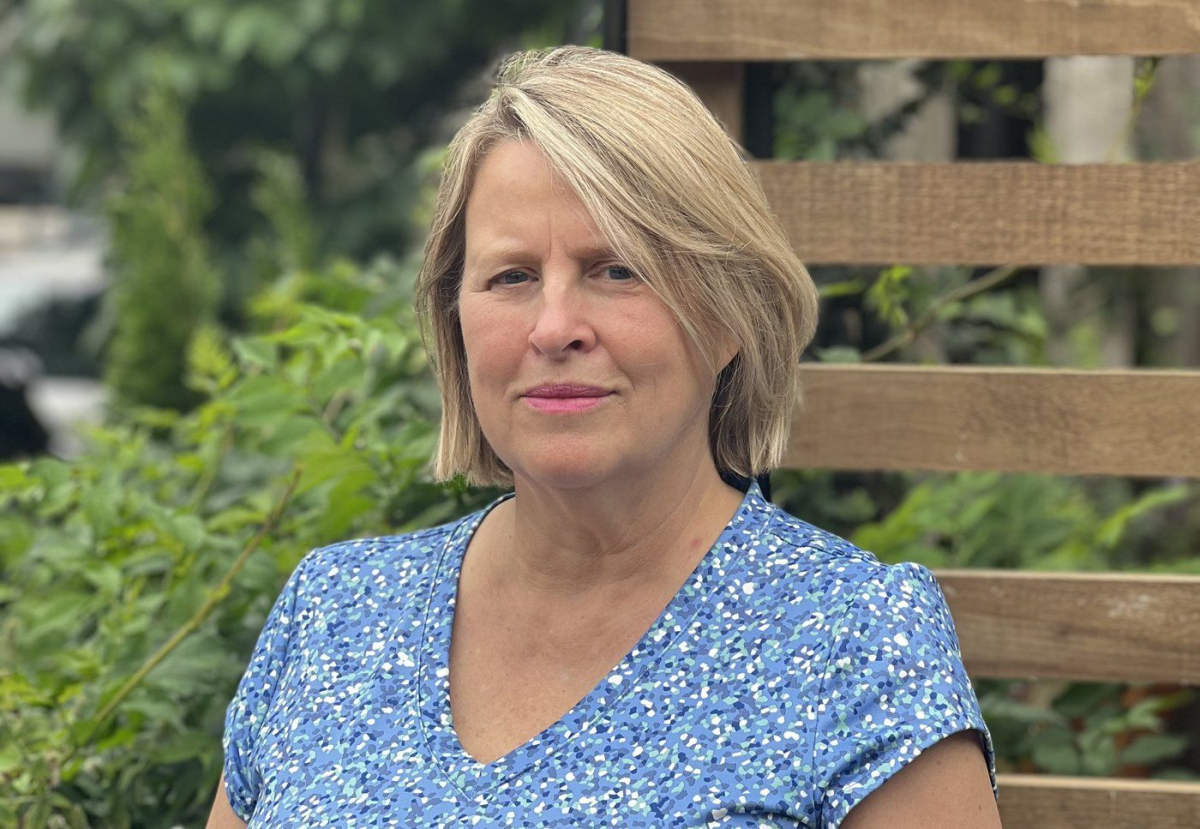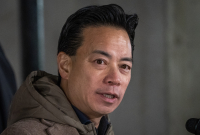Support strong Canadian climate journalism for 2025
The second woman to publicly accuse Alice Munro’s late husband of targeting her sexually when she was a child says she hopes her story will encourage parents to believe their children.
Jane Morrey was nine years old when she says Gerald Fremlin exposed himself to her while he was staying at her family’s Toronto home, several years before he married Munro. Fifty-five years later, she was inspired to speak publicly about it for the first time after learning that Fremlin had later sexually abused one of Munro’s daughters, Andrea Robin Skinner, when she, too, was nine.
Morrey, 64, says her experience was profoundly different from Skinner’s. Last month, Skinner described in an essay for the Toronto Star how for years after Fremlin assaulted her, she was sent back to her mother’s home every summer and continued to be abused by him. Her mother’s decision to stay with Fremlin after learning of the sexual abuse has tarnished the legacy of one of Canada’s most celebrated authors. Munro died in May, aged 92.
When Fremlin targeted Morrey, she said, her mother threw him out of the house immediately, and Morrey never saw him again until she was an adult. Looking back now, she said she doesn’t feel “particularly traumatized” by the incident.
“I never grew up feeling like I did something wrong, ever,” she said in a phone interview on Monday. “I felt like I was completely vindicated, because I was believed, instantly.”
Morrey, who first told her story to the Toronto Star, hopes her decision to speak out will help other parents understand how important it is to act decisively. “Aside from Alice Munro’s fame, aside from everything, if something happens and your child tells you, then believe them and act accordingly,” she said.
It was only after Skinner's essay was published that it became known Fremlin, who died in 2013 at the age of 88, had pleaded guilty in 2005 to indecently assaulting his stepdaughter.
Fremlin was a close family friend of Morrey’s parents. They had attended the University of Western Ontario together, along with Alice and Jim Munro, who would become the author’s first husband and the father of her three daughters, including Andrea.
Morrey’s older sister, Marianne Webb, said Fremlin visited their family often, and she doesn’t remember a time when he wasn’t friends with her parents. She said he never acted inappropriately toward her, and she remembers being “kind of jealous” that he would send her little sister postcards from his travels around the world. Now, she sees the behaviour as “subtle grooming.”
Morrey, who is seven years younger than Webb, said she loved getting postcards, gifts and attention from Fremlin and saw him as something of an uncle.
Then, when Fremlin was visiting in 1969, nine-year-old Morrey went into his room one morning to ask what he wanted for breakfast. She said he threw his blanket off and exposed himself to her. Shocked, she left the room and began making oatmeal.
She said Fremlin then followed her to the kitchen and told her, “I shouldn’t have flashed my c--k at you.”
“I’d never heard adults talk that way or use that kind of word,” she said. “My parents were very clinical about stuff.”
But Fremlin went on, she remembers. “Then he said, “OK, so you got to see me. Maybe you’d like to show me yours.’”
At that point, Morrey said, she left the room and woke up her mother to tell her what had happened. “My mother went berserk when I told her,” she said, and immediately got the girls to leave the house. Webb said they waited at the end of the street until they saw Fremlin’s car drive off.
When they got back, Morrey said, her parents told her Fremlin was never coming back to the house. After that, “they just didn’t speak of it again,” she said.
Morrey didn’t see Fremlin again until nearly two decades later, at a 1986 launch for one of Munro’s books. Munro and Fremlin had married 10 years earlier. “I went up to him and I said, ‘You probably don’t recognize me but I’m Jane Webb,' and he just looked terrified,” she said.
She didn’t confront him about the incident from her childhood, but she wanted to scare him. “He scared me when I was little and I wanted to look him in the eye and watch him squirm. I wanted him to worry about what I might do or say,” she said in an email. “I guess I wanted to show him that he wasn't the only person with power.”
Morrey has not spoken with Skinner, who was assaulted by Fremlin in 1976, several years after Morrey says he targeted her. But Morrey said she always wondered whether Fremlin had other victims, and whether anything might have happened with any of Munro’s daughters. “It was always kind of in the back of my mind, but I never really thought about it very much at all until (Skinner’s) article,” she said.
Now, she hopes other potential victims will feel safe enough to come forward. “As victims, there’s no shame in it,” she said.
Years after the incident, when Morrey was an adult, her mother struck up a new friendship with Fremlin. At that point, she said, her relationship with her mother was strained and she never confronted her about the friendship, which was short-lived. Webb also suspects their father quietly maintained a friendship with Munro’s husband. Both her parents have since died.
“The real enigma was how my parents recognized that he was a predator who needed to be kept away from their daughter and yet continued to enjoy his friendship,” Morrey said by email. “How he found a wife and at least two friends who could knowingly ignore his abhorrent and criminal behaviour is truly mind-boggling.”
Ultimately, though, she’s grateful to her mother for doing “the right thing in the moment,” especially when she contrasts her experience with Skinner’s.
“That was probably the most important thing she ever did for me,” she said. “The confidence that it gives you in being believed is so important.”
This report by The Canadian Press was first published Aug. 7, 2024.




Comments
We know that Alice Munro's daughter returned for summer visits with her for years after the first sexual abuse largely because her ex-husband didn't tell her. Her daughter also didn't tell her.
Alice Munro wasn't told until her daughter was an adult.
Why didn't her ex-husband tell her, and why didn't he prevent his daughter from visiting?
Why is all the blame heaped onto Munro? Clearly she didn't notice something was wrong, and she was also never given the chance to protect her daughter because the abuse was kept a secret.
At least in the case of Jane Morrey, who saw her mother defend her at the time of her abuse, Jane was not left with a lifetime of conflicted emotions and guilt. That is the way to handle sexual abuse - you tell.
There seems to be more to the story than "she didn't know." Her daughter is the victim here, not Alice Munro. In fact, some speculate that the daughter went public but the media wouldn't touch the story because it affected the reputation of a Canadian literary icon.
We are old fans of Munro and saw several of her talks where she always, without fail, received standing ovations filled with love, and were saddened when she stopped giving them due to health concerns. Victoria's Munro's Books is our favourite all time bookstore -- we were just there yesterday. Alice and Mr. Munro opened the store on Yates St decades ago, and then bought an old heritage bank building on Government St, a real gem. Mr. Munro gave the shop to his employees when he finally retired, an act of generosity that made the news.
A respected and loved writer may have had a private life where she stuck with her man over her daughter even after she was informed of the abuse, but that's for the daughter to tell. Either way Alice Munro's professional reputation will take a hit, even as her works and talent and legacy remain iconic.
This controversy is pitting a victim of abuse against a pillar of culture and extraordinary book sales. So far, the "not telling" seems to focus on protecting the icon's legacy and not the victim or her rights. That's very sad.